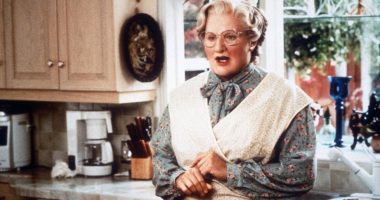
Ahead of the world premiere of Paul Schrader’s latest feature, Master Gardener, at the Venice Film Festival on Saturday, the legendary screenwriter and director was nudged into casting a backward glance on his 50-year career in the movies. Next week in Venice, the auteur will receive an honorary Golden Lion for his contributions to cinema.
Early in the press conference, Schrader was asked which of the films he’s directed he thinks best represents him.
“You know, directors like and dislike their children for different reasons,” he replied. “Probably my favorite is Mishima: A Life in Four Chapters, just because it’s the damnedest thing. I still can’t believe I ever made that film. The most personal for me is First Reformed or Affliction. The best stylistically, I think, is Comfort of Strangers. Cat People is kind of special. You know, others, for other reasons. So, I’ve been very lucky. But I’ve made some zeros, too, like we all do.”
Schrader added that making art that can stand the test of time has increasingly become a preoccupation of his. He explained: “More and more, films seem to have a shelf life, and that’s a very tricky thing with art — how do you give a film or work of art a longer shelf life? How do you make a film that will bring people back to watch it 20 or 30 years later?”
The director recalled a conversation he once had with Bruce Springsteen on the topic. “Bruce was very calculated about it,” he said. “He would go into a song and blur certain lyrics so that you can’t understand them for two or three readings, all to build shelf life. Of course, you will never know until 20 or 30 years later whether you were successful.”
When asked which aspect of his career he thinks is most being recognized by Venice with the Golden Lion for career achievement he will receive next week, Schrader noted the various phases he has had throughout his career. “I began as a film scholar, became a screenwriter and then a director,” he said. “But I also became a kind of entrepreneur — because how else do these odd little films get made, except for some poor schmuck like me hustling his ass around with a begging bowl? So that, in and of itself, is worthy of the Golden Lion,” he said to laughs from the crowd. “But I guess it’s for all of those things.”
Brought up in Michigan in a strict Calvinist family, Schrader famously didn’t see a movie until he was nearly 18 years old but later became one of Pauline Kael’s critical protégés, writing the film studies classic Transcendental Style in Film: Ozu, Bresson, Dreyer at the age of just 24. By 26, he was dissolute and living out of his car, writing the screenplay for what would become Martin Scorsese’s Taxi Driver. With that revolutionary script, Schrader gained entry to Hollywood’s executive suites, selling his next screenplay, Sydney Pollack’s The Yakuza (1974), for $300,000, a record sum at the time. He went on to write, or co-write, additional Scorsese classics including Raging Bull, The Last Temptation of Christ and Bringing Out the Dead. He made his directorial debut in 1978 with the crime drama Blue Collar (starring Richard Pryor and Harvey Keitel), and he has directed another 21 titles since, including his self-styled “man alone in a room” stories — American Gigolo (with Richard Gere), Light Sleeper (Willem Dafoe), First Reformed (Ethan Hawke) and The Card Counter (Oscar Isaac). He has helmed a collection of searing biographies, such as the Japanese drama, Mishima, arguably the most original film ever financed by a major studio; Patty Hearst; and Auto Focus, a telling of the lurid secret life and murder of 1960s TV star Bob Crane. He has also written nearly a dozen screenplays for other directors.
Toward the end of the press conference, Schrader was asked whether he wished he had directed any of the screenplays he wrote for other filmmakers.
“Well, thank god, I didn’t direct Taxi Driver,” he quipped. “I was arrogant enough to think I could have directed it — and that could have been a career killer. Instead, I learned by looking over the little guy’s shoulder.”
On his transition to the director’s chair, he said, “It wasn’t so much that I thought my scripts were getting fucked up. Maybe there were some of them I could have made better, but there were definitely some I would have made worse. What it really was is that I felt like half a person as an artist. I told myself, ‘If you want to be a writer, be a real writer and have people read your words. If you want to be a filmmaker, be a real filmmaker so people see your films.’ What is this thing called screenwriter? So, that’s what moved me on from just screenwriting to directing.”
Schrader hinted that Master Gardener could be his last “man alone in a room” film. In a restrained but sensitive performance, Joel Edgerton plays the new film’s protagonist, Narvel Roth, the meticulous horticulturist of Gracewood Gardens, the sprawling botanical estate of the wealthy dowager, Mrs. Haverhill, chillingly inhabited by Sigourney Weaver. As we meet him, Narvel is as fastidiously devoted to tending the estate’s beautiful grounds as he is to his eccentric employer. But when Mrs. Haverhill demands that Roth take on her troubled great-niece Maya (Quintessa Swindell), a young Black girl from the city, as a new apprentice, chaos creeps into his spartan existence, revealing hideous secrets from a violent, racist past that could threaten them all.
“Years ago, I came across a character who was sort of a product of European literature — Dostoyevsky, Camus, Sartre — and he ended up walking into movies as a taxi driver,” Schrader said of his method. “He was a new character in movies, and he’s been with us in movies ever since. Occasionally, I revisit him. And when the technology became possible and the budgets became lower, I had more freedom. So, I have revisited him three times in a row.”
Schrader said the biggest difference with the character today is that he has aged somewhat, as the director has, with the thematic interests that adhere to him shifting accordingly. “When he was a younger man,” Schrader said, “he would approach an older man, like Peter Boyle (as in Taxi Driver), and say, ‘I have these terrible thoughts in my head.’ Now he’s the older guy and young people approach him — the environmentalist (First Reformed), the kid who wants revenge (The Card Counter), the girl from the inner city (Master Gardener). That is just a process of aging and how this character has evolved.”
“Hopefully, I’m done with him,” he added with a chuckle.
Like all of his “man alone” stories, Master Gardener hinges on the question of absolution — although the sins in need of forgiveness in this film’s case are provocative even for Schrader. On this topic, the director said: “I don’t know whether [the gardener, played by Edgerton] can be forgiven. I don’t know whether this story is even possible — that you can be a white nationalist and be forgiven by a Black girl in the garden. That may be a fantasy, but it is a very interesting fantasy. And that’s what we do in art. We create these hypotheticals that are worth ruminating about.”
Read More: World News | Entertainment News | Celeb News
Hollywood






